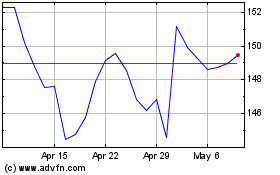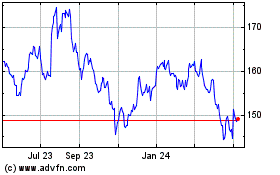Johnson & Johnson Talc Supplier Files for Bankruptcy
14 February 2019 - 5:38AM
Dow Jones News
By Katy Stech Ferek and Sara Randazzo
Imerys Talc America Inc. has filed for bankruptcy protection as
it faces accusations that the talc it supplied for Johnson &
Johnson's baby powder causes cancer.
The company filed for chapter 11 protection Wednesday after
spending tens of millions of dollars to defend itself against
lawsuits alleging its talcum powder causes ovarian cancer and
mesothelioma. The talc supplier faces claims from more than 14,600
people, a number that has grown dramatically in recent years in the
wake of large verdicts against Imerys and baby powder maker Johnson
& Johnson.
The two companies contend talc doesn't cause cancer or contain
asbestos and have succeeded in getting some verdicts overturned on
appeal.
The Imerys filing in U.S. Bankruptcy Court in Wilmington, Del.,
immediately suspends all talc-related litigation against the
U.S.-based mining company and will enable Imerys officials to
negotiate payouts with those who have sued them.
Imerys Talc America and another affiliate that filed for
bankruptcy employ more than 200 people at a Texas processing plant
and at mining operations in Montana and Vermont. The companies are
owned indirectly by French minerals company Imerys SA, which bought
the U.S. entities in 2011 when they were facing only a handful of
talc-related lawsuits.
Imerys Talc America President Giorgio La Motta said in a press
release that bankruptcy "is the best course of action to address
our historic talc-related liabilities and position the filing
companies for continued growth."
Documents made public through the litigation have shown efforts
that Imerys predecessor Luzenac America allegedly took to keep talc
from being listed as potentially carcinogenic by regulatory
authorities.
The company by 2006 became less involved in attempts to prove
talcum powder's safety, according to court-filed documents. After a
World Health Organization branch that year listed perineal use of
talcum powder as possibly carcinogenic, a Luzenac executive said
they were no longer interested in funding ovarian cancer research
because the "horse has already left the barn," according to an
email shown to jurors by plaintiffs lawyers.
In response to the release of those documents, Imerys has denied
wrongdoing.
Imerys also put its Canadian operations into bankruptcy. The
Imerys companies that filed for bankruptcy recorded $174 million in
revenue last year. Their operations will not be affected by the
filings, company officials said.
Bankruptcy rules give troubled organizations the chance to pool
money for victims from their assets, including insurance coverage,
and set deadlines for claimants to come forward -- a process
overseen by a federal judge. Imerys officials also may set aside a
pool of money for those who have not yet become ill but could later
sue over health problems.
U.S. bankruptcy law doesn't require companies to be insolvent to
seek court protection. For decades, major corporations facing
massive litigation liabilities have turned to bankruptcy to defend
themselves from lawsuits -- including those with claims from
asbestos-related illnesses -- that threaten to overwhelm their
businesses.
In 1982, Johns-Manville Corp. became the first manufacturer to
file for bankruptcy to deal with asbestos lawsuits. Dozens of
manufacturers have followed their lead, using the process to form
trusts for people with asbestos-related health problems.
Write to Katy Stech Ferek at katherine.stech@wsj.com and Sara
Randazzo at sara.randazzo@wsj.com
(END) Dow Jones Newswires
February 13, 2019 13:23 ET (18:23 GMT)
Copyright (c) 2019 Dow Jones & Company, Inc.
Johnson and Johnson (NYSE:JNJ)
Historical Stock Chart
From Nov 2024 to Dec 2024

Johnson and Johnson (NYSE:JNJ)
Historical Stock Chart
From Dec 2023 to Dec 2024
